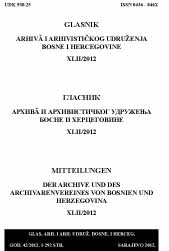Osvrt na provođenje Sporazuma o pitanjima nasljedstva nekadašnje SFRJ prilog „d“
Review of the implementation of the Agreement on legacy of the former SFRY Anex "D"
Author(s): Dragan MatičSubject(s): Museology & Heritage Studies
Published by: Arhivističko udruženje Bosne i Hercegovine AUBiH
Keywords: Sukcesija; SFRJ; beogradski arhivi; Sporazum o pitanju nasljedstva nekadašnje SFRJ.
Summary/Abstract: After the agreement was signed on the issues of heredity former Yugoslavia in 2001. even before ratification talks and efforts began to harmonize his performance in the field of archives. In these events interesting two sides were shaped. Representatives of Bosnia and Herzegovina, Croatia, Macedonia and Slovenian National Archives aspired to: - The quickest and pragmatic measures aimed at meeting free access to every SFRY State archives, which includes all of the documents; - Deciding on what material will be transferred to individual successor states according to the principle of origin, benefits, and which will remain the country where it is already (in most cases Serbia) as a common heritage; - Accepting the agreement on the management of the joint archival heritage, especially in terms of access and use; - Facilitating the prompt use of archival materials, that individual states should be the successor to its business or citizens to achieve legal interests. Representatives of the Yugoslav and later Serbian-Montenegrin and Serbian sides at the end, apparently as a party with different interests all the time interpreted restrictively (ie still interpret) agreement on succession issues of former Yugoslavia. That is still in practice in individual cases, like in the case of Annex D of the Agreement, the terms of an international act, which is above and to the National legislation is performed directly. Even a concern to (partially) obstruct immediate rights and freedom of access to archives or in absolute terms (refusal composing individual ministries that service in its entirety) or restrictive (closing time, not giving a list of supplies and material, limiting the number of copies, etc.) After May 2006. the successor states of each country changed list requirements for the Archives, ie the one that would seem to the common heritage of discussions / negotiations on the performance did not occur. This is conditional on the one hand with those that had not yet been entirely possible immediate access to all the archives and records had not yet been registered, on the other hand the reason is in the interest of the successor too small individually to the appropriate diplomatic and political succession perform in a relatively short time frame. The author points out, that the efforts of the Slovenian archival profession in the area of succession were great, but what was missing was more prominent and continuous service engagement by the diplomacy and politics regarding this issue.
Journal: Glasnik arhiva i Arhivističkog udruženja Bosne i Hercegovine
- Issue Year: 2012
- Issue No: 42
- Page Range: 22-43
- Page Count: 22
- Language: Bosnian
- Content File-PDF

